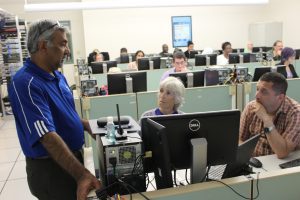Summer Working Connections registration opens Wednesday
This week, the National Convergence Technology Center (CTC) will launch registration for Summer Working Connections on Wednesday morning, April 19. For the first time, we’ll be hosting two weeks of Working Connections – an in-person week here at Collin College north of Dallas July 10-14 and then an all online week July 17-21.
Regular blog readers know that Working Connections events (five days in July, three days in December) offer cutting-edge, cost-effective professional development opportunities to current community college (and university) IT faculty that’s typically only available through expensive commercial training. The goal is for attendees to add this content into their home programs as soon as possible, either as a new course or as a supplement to an existing course.

This training is also open to high school IT faculty.
Learn more here – as of this Wednesday, April 19, that page will also provide access to the registration form to sign up.
This year we’re featuring seven tracks in person…
* “AI Awareness and Essentials” will survey the fields of Artificial Intelligence (AI) and Machine Learning (ML). Attendees will explore fundamental AI and digital competency concepts and skills utilized for classification algorithms (supervised, unsupervised, and reinforcement learning), data preparation, training/using learning models used for Data Analytics, Image Processing, and Natural Language Processing.
* “AWS Cloud Practitioner” will provide an overall understanding of cloud computing concepts, independent of specific technical roles. This track will provide a detailed overview of cloud concepts, AWS core services, security, architecture, pricing, and support.
* “Azure Fundamentals” will immerse attendees in the fundamentals and exam considerations for the Microsoft Azure AZ-900 exam. Learn about the principle of infrastructure-as-code and how to successfully deploy resources in Azure. Specifically, the track will provide an overview of the key components of Information Security such as Identification, Authentication and Authorization, Virtualization and Cloud Computing, Wireless Networks, Network Monitoring, and Network Security Controls.
* “Big Data Analytics and Visualization” will offer an introductory look at the world of Data Visualization Dashboards and Big Data Analytics. Attendees will learn the basics of Big Data and how businesses including higher education institutions are creating a culture of data-driven decision-making.
* “Foundations of Designing and Building the Converged Internet of Things” will allow attendees to “get their hands dirty” by walking through various lab assignments in support of IoT technologies. Labs will be both “high- touch” and virtual. All of the exercises demonstrated and performed during this course can be done in a typical networking classroom/lab (such as A+, Network+ or Cisco).
* “Leadership Academy” will help attendees develop skills and strategies to take their program to the next level. Specifically, attendees will learn how to better engage employers, how to use EQ tools to improve communication and collaboration, and how to find personal and professional success as we transition to a “4.0” world.
* “Splunk Security Essentials” will combine Splunk knowledge with best practices to help attendees address cybersecurity threats fast. Get hands-on practice working events and hunting for threats using Splunk Core, Enterprise Security, and SOAR, and set yourself up for cybersecurity success.
And six tracks online…
* “AWS Academy Cloud Architecting” will cover the fundamentals of building IT infrastructure on Amazon Web Services, or AWS. Attendees will learn how to optimize the use of the AWS Cloud by understanding AWS services and how these services fit into cloud-based solutions. This track provides prep for the AWS Certified Solution Architect Associate Exam and Certification.
* “Cyber Buffet” will cover five classes worth of material in a week: securing web applications, securing APIs, attack techniques, network security monitoring with Splunk, and ARM Assembly and exploitation. There are many hands-on projects for each topic, ready to be inserted into attendees’ classes.
* “The Data Science House We BILT” Avoid these mistakes, missteps and blunders when creating a new program: a look back on the development of a two-year Data Science program and a look ahead to implementing lessons learned via hands-on exercises in R, Python, and GitHub.
* “Introduction to RING” will look at RING (Regions Investing in the Next Generation), the online high school cybersecurity course that offers interesting and engaging content specifically for students and schools without an existing cybersecurity program. This track will serve as a preparatory overview course to assist attendees in planning and delivering content to Middle, High, or post-Secondary education students
* “IT Essentials” will cover materials from the Cisco Networking Academy aligned to the CompTia A+ certification. Attendees will learn how to prepare students for entry-level IT jobs, including skills and procedures to install, configure, and troubleshoot computers, mobile devices, and different Operating Systems.
* “Security+” prepares attendees to take the CompTIA Security Plus SY0 601 exam. Security+ is often the first certification in information security that an IT professional earns. Showing potential employers that you have the core skills required for a cybersecurity role, students may find more job opportunities as a more competitive candidate.
